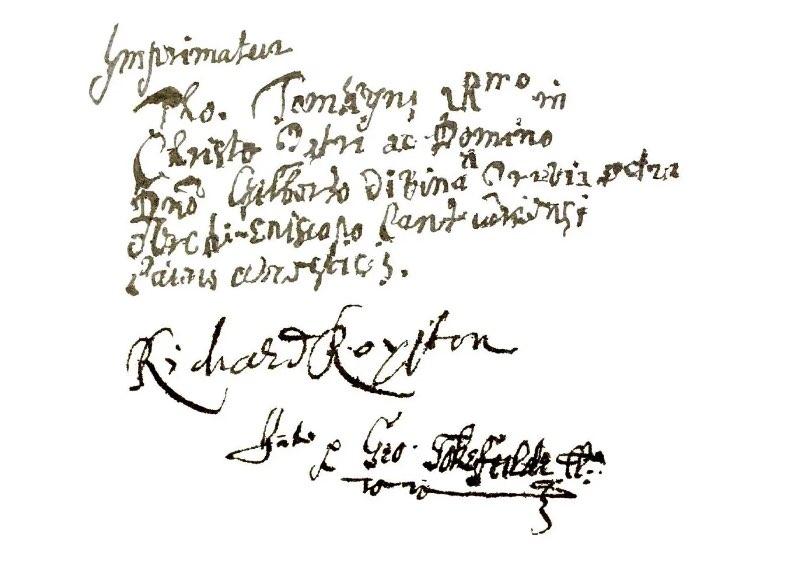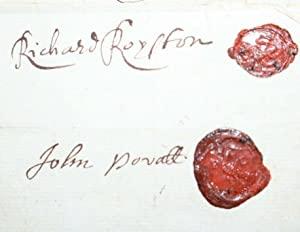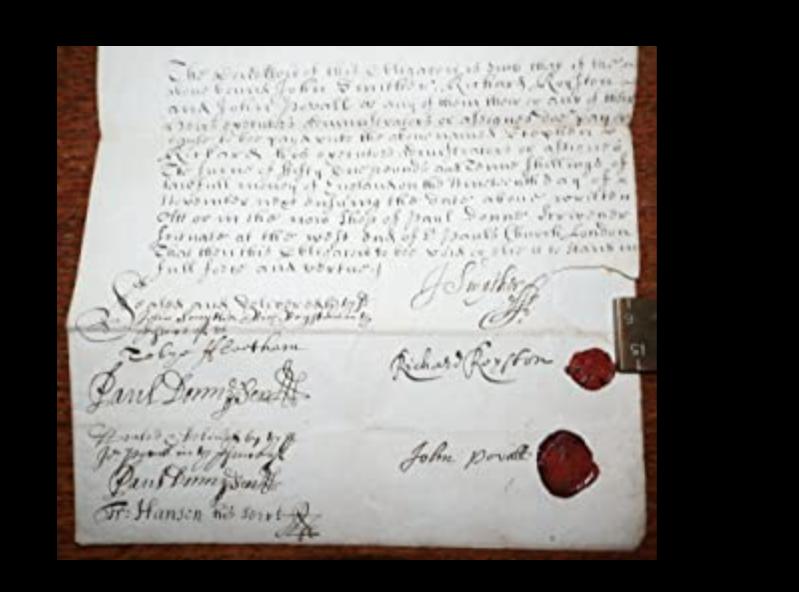The Bookseller to Three Kings
Imprimature to John Milton’s Paradise Lost signed by Richard Royston on the Paradise
Lost original manuscript in the collection of of the Morgan Library
Printer Richard Royston, 1667

Signature of Richard Royston, 1665, with his wax seal in the collection of the Yuko Nii Foundation


Of the 10,000-line manuscript John Milton sent to the Stationers’ Company in London in 1665, only 798 lines survive. These 33 pages correspond to Book 1 of 10 in the first, 1667 edition;
This partial manuscript is the only known evidence of the creative process of Milton’s magnum opus.
The first page of the manuscript presents the imprimatur of the Stationers’ Company, signed by Richard Royston, official instructions that were necessary at the time for printing and publishing a book. Translated from the Latin by the scholar Gordon Campbell, it reads: “Let it be printed. Thomas Tomkyns, one of the religious servants of the most reverent father and lord in Christ, Lord Gilbert, by divine providence archbishop of Canterbury. Richard Royston. Entered by George Tokefield, clerk.”
Richard Royston (1601, Oxford November 1686) was an English bookseller and publisher, bookseller to Charles I, Charles II and James II.
In the 1630s he published work by John Donne and Thomas Heywood. Royston was charged by John Wright, parliamentary printer, on 31 July 1645, as being the "constant factor for all scandalous books and papers against the proceedings of parliament". Royston was confined to the Fleet prison, and petitioned on 15 August for release. In 1646 he published Francis Quarles's Judgment and Mercie for afflicted Soules, and wrote and signed the dedication addressed to Charles I. In 1648 appeared, "printed for R. Royston in Ivie Lane", the first edition of which about fifty impressions were issued six months. On 23 May 1649 Royston had entered to him in the register of the Company of Stationers "The Papers which passed at Newcastle betwixt his sacred Majesty and Mr. Henderson concerning the change of church government". He was examined in October 1649 for publishing a "virulent and scandalous pamphlet", and bound in sureties to "make appearance when required and not to print or sell any unlicensed and scandalous books and pamphlets". He came
before the council of state again in 1653 for a similar offence. On 29 November 1660 Charles granted to him the monopoly of printing the works of Charles I, in testimony of his fidelity and loyalty, and "of the great losses and troubles he hath sustained in the printing and publishing of many messages and papers of our said Blessed Father.
On 6 May 1663 Charles II took the unusual course of addressing a letter to the Company of Stationers to request the admission as an assistant of "Mr. R. Royston, an ancient member of this company and his Majesty's bookseller, but not of the livery". As king's bookseller Royston caused the stock of Richard Alleine's Vindiciæ Pietatis (1664, &c.) to be seized in 1665 for being published without license, but afterwards purchased the stock as waste-paper from the royal kitchen, bound the copies, and sold them. For this he was reprimanded by the privy council. Royston had a further proof of the goodwill of the king on 29 September 1666, when he had a grant of £300 in compassion for losses sustained in the late fire. "Orthodox Roystone", as John Dunton called him, was master of the Company of Stationers in 1673 and 1674, and bequeathed plate to the company.
Stationers’ — founded as the Worshipful Company of Stationers in 1403 — is one of the City of London’s livery companies, a guild of paper makers and publishers that was granted a royal charter in the 16th century. It remains, albeit in an advisory role, to this day.
The Yuko Nii Foundation has over 400 English wax seals from the 17th century plus seals of king Henry VIII, Queen Elizabeth I, and King Charles I. Perhaps the largest collection of its kind.
